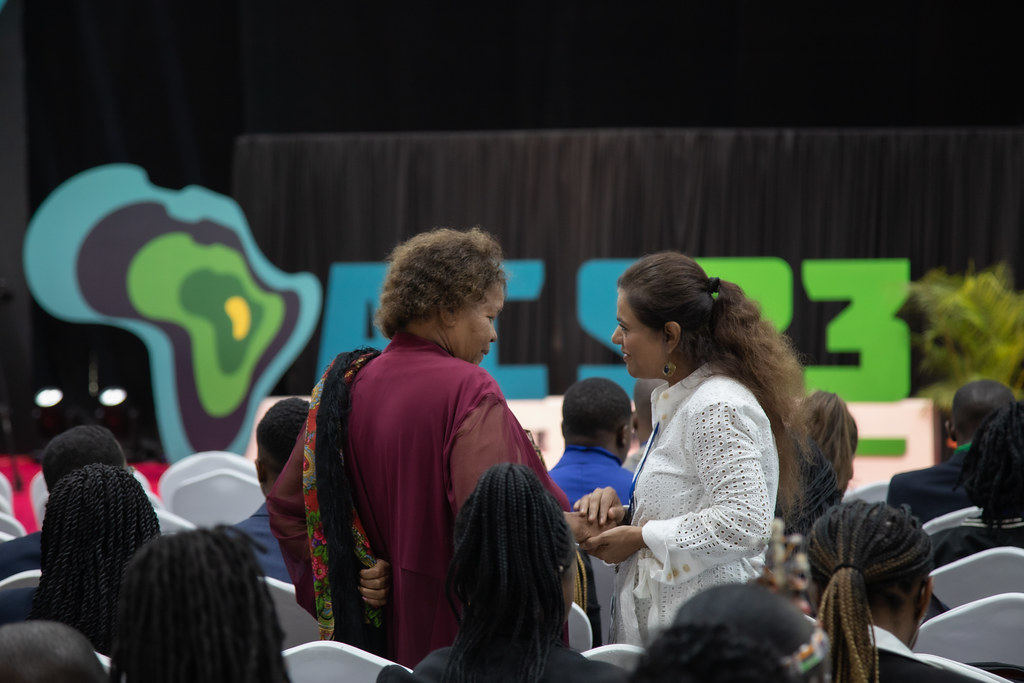Funding these essential meetings would cost little to rich countries but provide a potentially invaluable forum for developing countries.

Last year’s regional climate week in Africa saw the hosting of the first Africa Climate Summit. Credit: KRCS-Denis Onyodi.
The UN Framework Convention on Climate Change (UNFCCC), the body that coordinates the global response to climate change, announced on 25 March that it will not be organising regional climate weeks due to resource constraints. Its Executive Secretary Simon Stiell has alluded to a funding deficit of $85 million that would need to be filled by donations for the meetings to go ahead.
Weeks later, no country or private entity has stepped forward to rescue the situation, despite the relatively minimal financial cost needed.
Regional climate are weeks held every year in one or more of the following regions: Africa, Latin America and the Caribbean, Asia-Pacific, and the Middle East and Northern Africa. They bring together diverse stakeholders from governments and NGOs, public and private sectors to advance cooperation and collaboration to address the climate change crisis. They also provide fora in which Majority World countries can express their needs and seek climate funding. Last year, the Africa Climate Week in Nairobi hosted the Africa Climate Summit which produced the Nairobi Declaration, the continent’s common position ahead of the COP28.
By amplifying the voices of youth and grassroots organisations, regional climate weeks can also open up pathways to justice that would not otherwise be available. Bringing together diversity in stakeholders is crucial to ensure diversity of thought, opinion, and solutions-making.
If we are to meaningfully address the climate crisis, we must commit to finding and elevating the best and brightest voices and removing barriers to entry. Cancelling regional weeks and limiting participation at climate talks – as proposed by the UNFCCC for the upcoming first Loss and Damage Board Meeting – would undermine this goal. Robust participation, transparency and accessibility in multilateral processes is the floor, not the ceiling, to establish engagement driven and informed by the communities most impacted by the climate crisis.
Discontinuing climate weeks will fragment efforts, leaving communities and governments isolated and uncertain. As COP29 looms in a Eurasian country, out of reach for many African travellers, these regional platforms play an even more important role in building consensus and advancing ambitious climate action agendas.
It is disappointing that rich countries have failed to provide the funds needed to combat the climate crisis, given that a large proportion of their wealth is generated by pollution that affects poorer people disproportionately. Oxfam recently reported that the richest 1% emit four times more planet-heating pollution than the entire African continent.
Meanwhile, ordinary people see their crops dying, their food getting impossibly expensive, their homes swept away by floods. These conditions trigger more conflict and suffering. Over 53.3 million people in the East and Horn of Africa are in need of humanitarian assistance and more than 26.8 million are experiencing acute hunger. In West and Central Africa, more than 48 million people – the highest figure in a decade – are at risk of facing hunger in the coming months. Southern Africa is also facing drought. In Zambia, over 6 million people are currently suffering from hunger and water shortages.
Yet there are solutions. Oxfam calculates that a 60% tax on the incomes of the richest 1% would cut emissions by more than the total emissions of the UK and raise $6.4 trillion a year to pay for the transition away from fossil fuels to renewable energy.
The failure of rich donors to save the regional climate weeks is yet another glaring demonstration that they continue to choose profit over the wellbeing of people and the planet. Their reluctance to intervene undermines solidarity and collaboration, hindering effective climate action. It also risks undermining progress made in international climate negotiations.
In the absence of regional climate weeks, African governments and stakeholders need to capitalise on other available spaces to push for unified messaging on climate action. These include the upcoming 5th round of the Africa Climate Talks (ACT!) series in Addis Ababa as a build-up to the 11th Conference on Climate Change and Development in Africa (CCDA-VII) and COP29.
The fight against climate change is not just a scientific or environmental issue – it is a moral imperative. It is a battle for the soul of humanity, against a system that prioritises greed over compassion, exploitation over stewardship. Until we realign our priorities to put humanity over profit, meaningful progress towards climate justice will remain elusive.




